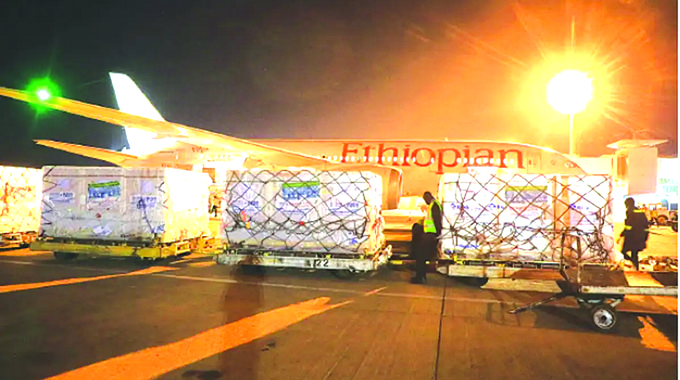The Herald

Rumbidzayi Zinyuke
Senior Health Reporter
Today 2021 comes to an end, marking the end of another year of fighting the Covid-19 pandemic which left thousands dead, and millions bearing the scars of the worst pandemic to ever be experienced in decades.
Although the pandemic is still spreading its tentacles, mutating to form new variants, Government has made concerted efforts to put in place mechanisms to respond to the pandemic, most of which have paid off.
The year kicked off on a bad note which saw the number of active Covid-19 cases and related deaths increasing as the country entered the second wave of the deadly pandemic.
On January 2, the country was put into a tight level four national lockdown, which helped to tame the second wave and curb the infection rates.
With the second wave under control, Government launched the national vaccination programme in February making Zimbabwe one of the first African countries to roll out vaccines as part of measures to protect the population against the Coronavirus.
This saw health workers and other key personnel at high risk of infection getting their first jabs.
The second stage brought in teachers, security services, judiciary, the clergy and people with chronic illnesses over and above the initial target group of frontline workers.
Despite the scepticism that initially marred the vaccine roll-out, by April, uptake gradually increased necessitating the introduction of more vaccination sites across the country as part of efforts to decentralise the process and decongest existing service points.
The drive resulted in the country surpassing the 100 000 mark of people who had received their first dose of the vaccine in almost six weeks, and once that milestone was achieved, progress has not stopped.
The launch of the private sector inoculation drive helped to pick up pace in the roll-out.
Under the business preparedness prevention and response initiative (BPPRI), business organisations that include the Confederation of Zimbabwe Industries (CZI), Bankers association of Zimbabwe (BAZ), Chamber of Mines of Zimbabwe, Insurance Council of Zimbabwe, Zimbabwe Council for Tourism and the Zimbabwe National Chamber of Commerce pooled resources and ideas to provide a coordinated response to the Covid-19 pandemic.
Cimas was appointed the Programme Technical Partner and Health Advisor for the Private Sector Vaccination Initiative and the vaccines acquired through the initiative were dispensed through Cimas facilities and various business premises countrywide.
Churches also joined in the drive, partnering Government in an initiative code named, Operation Marah, which encouraged congregations to embracing the vaccination drive.
The roll-out was also extended to the 16 to 17 -year age group, bumping the numbers significantly.
In July, the national Covid-19 vaccination programme had reached 1 million people as the daily vaccination numbers continued to rise.
By December 29, a total of 4 112 241 people had received their first Covid-19 jab while 3 121 783 people had received the second dose.
After the approval by Cabinet for vaccination centres to start administering the third jab, a booster shot meant to increase immunity against the Coronavirus, a total of 4 596 have received the shot.
Vaccine procurement
To ensure continuity of the vaccine roll-out exercise, Government initially mobilised US$100 million towards the purchase of Covid-19 vaccines.
An additional US$40 million was utilised to ensure that the country had enough doses to reach out to 10 million people for the attainment of herd immunity.
The vaccines purchased by the government were also complemented by donations from friendly countries.
The initial 200 000 Sinopharm vaccine doses, a donation from the Government of China was received on February 15 before the arrival of the first procurement of 144 000 Sinovac doses and another Chinese donation of 200 000.
The country has also received donations from Indian Government of 35 000 Covaxin doses and 50 000 Sputnik V doses from Russian mining giant Alrosa.
On July 7, Zimbabwe received the single largest shipment of Covid 19 vaccines of 2 million Sinovac doses which helped to boost supply of the vaccines to all centres across the country.
Since then, more than 10 million vaccine doses have been received in batches including a shipment of nearly 1 million doses from the Covax facility.
The COVAX Facility is a global partnership comprised of the Coalition for Epidemic Preparedness Innovations (CEPI), Gavi, the Vaccine Alliance, UNICEF and WHO, established to facilitate equitable access to Covid-19 vaccines for all countries.
The Covid-19 vaccines through the COVAX Facility are mainly generous contributions from over 20 countries among them the United States of America, Germany, United Kingdom, European Union, Sweden, Canada, and Saudi Arabia.
Although the country did not meet its target to reach herd immunity by year end, a lot of ground has already been covered putting the country ahead of most of its regional counterparts.
Public health experts have called for more targeted interventions to increase vaccine literacy as a way of increasing uptake.
While Covid-19 vaccination will allow the country to fully reopen economic activities, experts say continued adherence to preventive measures to avoid the spread of the virus will be essential going into 2022.


